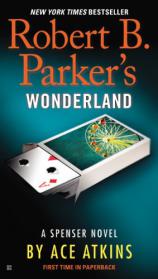Robert B. Parker's Wonderland: A Spenser Novel
Review
Robert B. Parker's Wonderland: A Spenser Novel
I do not think I need to tell you about the striking way in which Ace Atkins has assumed the mantle of the late Robert B. Parker in order to continue the Spenser series. Undertaking such a task is fraught with difficulty, even under the best of circumstances: one can make changes, but must do so slowly and wisely. Otherwise, the established readership becomes unhappy. Yet, there are some realities that demand to be addressed. A problem faced by Atkins is that Spenser’s transformation from middle age to the twilight of his life can no longer be ignored. Spenser remains capable, competent and confident, yet it cannot be denied that he has paid many tolls crossing innumerable bridges. He certainly has Hawk to rely upon, but he can’t lean on him, not at this stage. Otherwise, what would be the point of continuing the series, at least in its present form?
"Atkins, however improbably, has managed to nudge this venerable series in a new direction while staying true to its core, seemingly channeling its creator at every turn. It’s a magnificent accomplishment that is not to be missed."
What Atkins does in WONDERLAND, the second of his Spenser novels, is to take some subtle steps that will play out more completely over the next several installments. The first of these is that he takes Hawk and Susan Silverman, Spenser’s long-standing love interest, out of play to varying degrees for the duration of the story. Hawk is on an out-of-state frolic of his own, while Susan is at a teaching seminar. Hawk is referenced, but not otherwise present; Susan makes an occasional entrance by telephone, and at one point appears for the middle-aged equivalent of a booty call. The void, if that is the right term (Spenser is quite capable of propelling a story along all by his lonesome), is filled --- at least so far as Hawk’s role is concerned --- by Zebulon Sixkill. Zebulon, introduced in last year’s LULLABY and known as “Z,” is Spenser’s appointed rough-hewn protege; he has the tools but not the skills to use them to their full capacities.
Unfortunately, being an understudy of Spenser’s life and work does not permit a long learning curve. The book begins with a request from a character who has been unobtrusively present almost from the inception of the series. Henry Cimoli runs the gym where Spenser and Hawk --- and now Z --- train on a regular basis. As is inferred at a couple of points in WONDERLAND, Cimoli had some hand in shaping Spenser’s destiny, and is now doing the same with Z. Cimoli uncharacteristically comes to Spenser with a request for a favor. A developer is attempting to buy the building where Cimoli’s condominium is located in order to convert it to another use. Cimoli and a number of other elderly residents do not want to move for various reasons. When they resist, some thugs are dispatched to the scene to make life uncomfortable for the residents.
Spenser does what he does, and well, though not without some physical cost to Z, who is not yet entirely seasoned. The aftermath of one encounter in particular puts Z off-balance, and there is some question whether he’ll bounce back, emotionally as well as physically. Spenser demonstrates that he is a tough old guy, but still old(er). He can get the job done, but not with the usual aplomb.
At one point, Atkins presents an extremely ugly but very realistic fight scene that is presented as well as or better than any I have read in recent memory. It’s the type of scene that asks, in a whisper, how many more such encounters Spenser can handle. Still, the message is delivered. The developer, who is looking to introduce high-stakes casino gambling to the Boston area, makes the building residents an incredible offer that they ultimately accept; everyone walks away happy and the book ends.
Except that is not what happens. The developer, a Vegas high roller with an eye for the ladies, is subsequently found in very dead circumstances. It seems that there is some competition for that property and for the casino. Spenser agrees to help the developer’s widow in the hunt for her husband’s killer, and along the way gets caught crossways in a series of maneuvers involving greed, jealousy and death. Z and Spenser are both tested to their limits, but the question that is not answered until almost the final page is whether either of them or both will walk away from the conclusion.
Spenser makes some moves that upset the extremely delicate balance he has established with Boston’s underworld, and all but certainly will have some repercussions in future volumes. What will happen with Hawk remains to be seen (talk about delicate balances), but what is certain is that Atkins, however improbably, has managed to nudge this venerable series in a new direction while staying true to its core, seemingly channeling its creator at every turn. It’s a magnificent accomplishment that is not to be missed.
Reviewed by Joe Hartlaub on May 10, 2013





